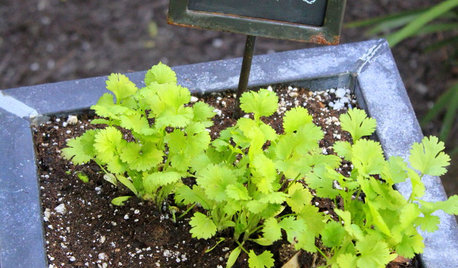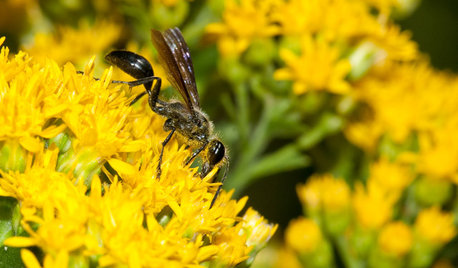The soapy spray thread ...
catholicokie
17 years ago
Related Stories

REMODELING GUIDESHow to Keep Your Home's Beautiful Glass Sparkling Clean
A few simple tools and tricks keep water spots and soapy film at bay
Full Story
BEDROOMSHow to Choose the Perfect Bedsheets
Don't lose any shut-eye over scratchy or ill-fitting sheets; our mini guide to materials, thread count and fit will help you sleep tight
Full Story
TRADITIONAL STYLEDecorating With Antiques: Silver’s Legacy
Learn how to tell sterling from plate, ways to display pieces and why silver is so darn special to begin with
Full Story
GARDENING GUIDESHerb Garden Essentials: Versatile Cilantro Adds Flavor to Herb Gardens
Love it or hate it, this cool-season herb contributes its unique flavor to any number or the world’s cuisines
Full Story
GARDENING GUIDESMeet the Grass-Carrying Wasp, a Gentle Pollinator of Summer Flowers
These fascinating insects nest in wood cavities and hollow plant stems
Full Story
KITCHEN DESIGNWonderful Wood Countertops for Kitchen and Bath
Yes, you can enjoy beautifully warm wood counters near water sans worry (almost), with the right type of wood and sealer
Full Story
DECORATING GUIDES8 Wonderful Ways to Splurge With Silk
Treasured for its luster and elegance, this fabric far outshines its imitators in all kinds of uses around the home
Full Story
STUDIOS AND WORKSHOPSCreative Houzz Users Share Their ‘She Sheds’
Much thought, creativity and love goes into creating small places of your own
Full Story
HOUSEKEEPINGHow to Wash Your House
Avoid damage to siding and plants while getting your home's exterior shining clean, with this guide to using pressure washers and hoses
Full Story
HOUSEKEEPINGThe Best Way to Get Your Windows Spotlessly Clean
Learn the pros’ tips and tricks for cleaning windows and getting them streak-free
Full Story


gumby_ct
gonefishin
Related Discussions
Watering with soapy water
Q
Question about spraying for aphids with soapy water
Q
Soapy water for indoor lemon with spider mites?
Q
Hose-end sprayer to put soapy water on house siding?
Q
barkeater
zeedman Zone 5 Wisconsin
barkeater
peggy_g
digit
vegipaul
gonefishin
npthaskell
brigid32
john90808
hamiltongardener
raisemybeds
john90808
figtreeundrgrnd
gumby_ct
aberwacky_ar7b
smikes1031
npthaskell
ligardener
npthaskell
paulns
womanhead
florey